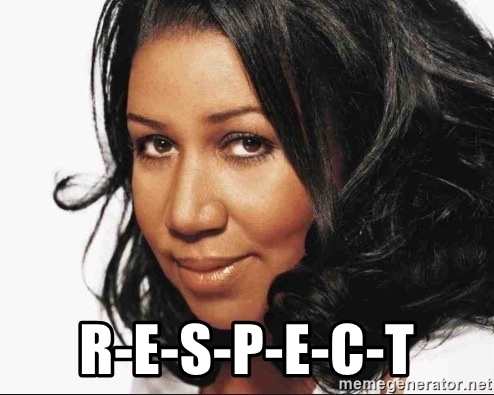 “Find out what it means to me.”
“Find out what it means to me.”
It turns out that most managers could learn something from the late Queen of Soul. Recent research reported in Harvard Business Review* explains that when you ask workers what means most to them, they often say feeling respected by superiors tops the list. Yet employees report more disrespectful behavior each year.
Leaders need to learn more about respect and what it means to their teams.
The article suggests that there are two types of respect:
*Owed Respect is accorded equally to all employees. It is about creating a culture of civility and a feeling that all employees are inherently valued (versus interchangeable parts).
*Earned Respect recognizes individual employees who display valued qualities or behaviors; it is performance based. High performance “earns” this additional type of respect.
Creating respectful environments leads to higher organization performance, as per the article:
“A respectful workplace brings enormous benefits to organizations. Employees who say they feel respected are more satisfied with their jobs and more grateful for—and loyal to—their companies. They are more resilient, cooperate more with others, perform better and more creatively, and are more likely to take direction from their leaders.”
The author suggests seven ways to build respect in an organization:
Establish a Baseline of Owed Respect. Every employee should feel that their dignity is recognized.
Know How to Convey Respect in Your Particular Workplace. This may vary depending on your workplace – so you need to explore – but could include active listening, taking an interest in the nonwork lives of employees, and remaining open to advice.
Recognize that Respect has Ripple Effects. The leader’s acts of civility, and incivility, can spiral throughout a workplace.
Customize the Amount of Earned Respect You Convey. Don’t praise or recognize everyone the same way. Higher performers should receive custom recognition.
Think of Respect as Infinite. There is no limit to respect – we each have an infinite amount we can bestow on others.
See Respect as a Time Saver. Giving respect does not take extra time. It is about “how” you are doing what you are already doing.
Know When Efforts to Convey Respect Can Backfire. If you are inconsistent or haphazard with the way you convey respect, it can create problems. Be sincere and consistent.
Treating others with respect is both the right thing to do and the smart thing to do for leaders.
“Sock it to me, Sock it to me, Sock it to me! Just a little respect” can go a long way.
*Thanks to a former student in my Nonprofit Strategy course, Victoria Curzel for suggesting this article for a blog: “Do Your Employees Feel Respected,” Rogers, K., Harvard Business Review, July – August 2018, pp. 62 – 70.